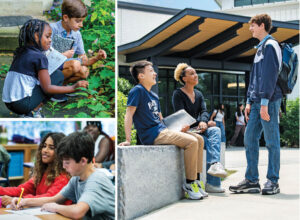Poetry can feel intimidating, like a puzzle or a math problem to solve. It seems, often, that to understand a poem requires esoteric knowledge gleaned from years of study. But poet and theologian Pádraig Ó Tuama rejects that view. To his mind, poems are not Rubiks cubes or puzzle boxes built of lines and stanzas that must be pried open by a tenured college professor. Instead, he argues poetry is a radically honest conversation between reader and poet, grounding the experience and rendering what once seemed abstract boldly tangible.
On every episode of his popular podcast Poetry Unbound, Ó Tuama chooses a single poem to read and meditate upon. He describes his own podcast as an invitation for the listener to meet the poems with open arms. He insists that “the poems are eager to meet you, too.”
In an interview with The New Yorker, Ó Tuama suggests that when people engage with poems, what they are really looking for is a doorway into themselves. “People are looking for accidental liturgies,” he remarks, gesturing at the spiritual experience of hearing a story, idea or phrase and inviting it into their own lives for reflection. These simple moments may resonate with those familiar with the Quaker tradition.
Through the generosity of the Susan Salesky Rudin ’57 Distinguished Visiting Professorship Lecture Series, Ó Tuama has been invited to speak and give a reading at Abington Friends School on Thursday, February 16 from 7 to 9 p.m. as part of the Mary Lynn Ellis Poetry Program.
Upper School English Department Chair Sheila Pai, a member of the committee bringing Ó Tuama to Abington Friends School, is a big fan of Ó Tuama’s work.
“I am most looking forward to hearing Pádraig Ó Tuama’s insights gained from deep experience in creating community and facilitating healing across differences,” explains Sheila. “In Pádraig Ó Tuama, however, we also have a poet who uses poetry for healing and reconciliation.”
In preparation for his visit, a group of Upper School students listened to an episode of the podcast themselves on Ó Tuama’s meditations on David Wagoner’s poem “Lost”.
“When I am lost, I look around and notice the small things,” reflects one student. “I think about how I may be lost now but not forever. I will be found in the future. It is also important that I stay still when I am lost and be calm, be aware.”
Another student drew the poem within themselves, reflecting on their experience during quarantine and the advice they would give their younger self: “Over quarantine you could say I was ‘lost.’ I did not know what I was doing with my life due to the month gap in between when school was shut down and started up again online. I was extremely happy, free of all my responsibilities. But this happiness did not last very long. I picked up some unhealthy habits and blamed them on Covid. I think the advice I would give someone who is lost is to just take a step back and understand what needs to be done.”
By tying the poem to their own experiences, each student knits the poem into the fabric of their lives where they can continue to be in conversation. Sheila was touched by the intimacy bared by students in their engagement with Wagoner’s lyricism and Ó Tuama’s analysis. “I was stunned by the depth of connection to the concept and poem along with the depth of insight in the self-reflection and advice,” Sheila said. “All that wisdom together would make a valuable and supportive guide for students as they journey through life!”
“As David Whyte said, poetry is a ‘learned skill to force yourself to… articulate possibilities for the future,’” recounts Sheila. “It is this well-honed skill of poetic peace-making that most excites me about the wisdom Ó Tuama is bringing to our community and to the local public.”

